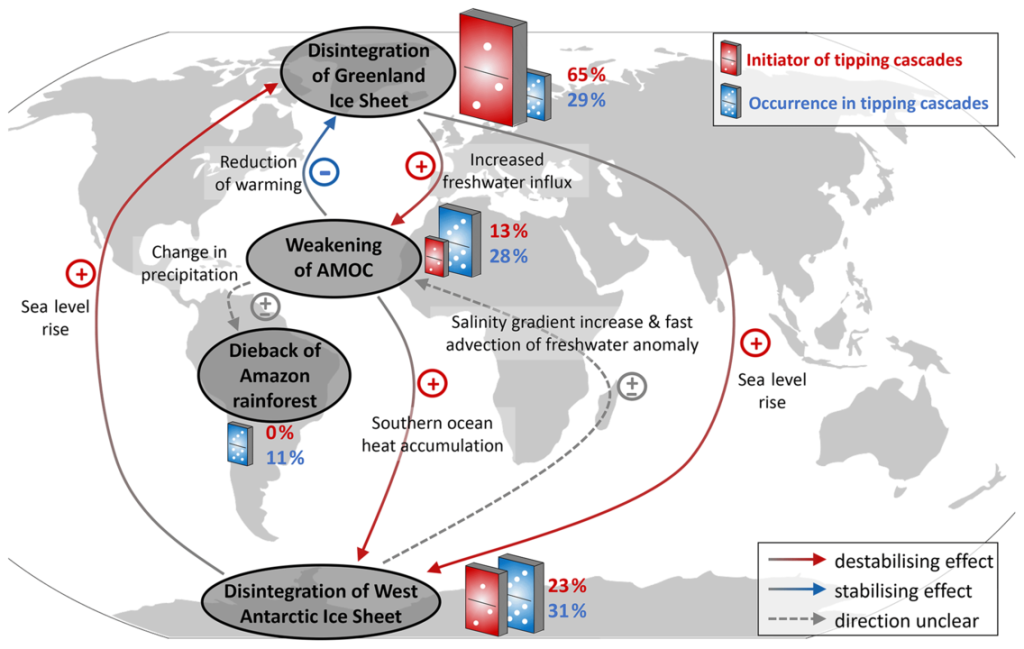
Analysis: Leading scientist accuse Guardian of misinformation as Danish researchers highlight concerns over potential collapse of the AMOC current system

By Anders Lorenzen
In a recent study, Danish researchers have raised alarms about the potential collapse of the Atlantic Meridional Overturning Circulation (AMOC) current system. The AMOC plays a crucial role in regulating global climate patterns and has a significant impact on weather conditions and sea levels along the Atlantic coastlines. The findings of this study have heightened concerns among the scientific community, policymakers, and the public alike, stressing the need for increased attention and action to mitigate the potential consequences of such an event.
What is the AMOC
The AMOC is a complex system of ocean currents driven by differences in temperature and salinity. It transports warm surface water from the tropics to the North Atlantic, where it cools down and sinks to deeper layers. This process drives a global oceanic conveyor belt, redistributing heat and influencing weather patterns. The AMOC also plays a vital role in regulating the global climate by controlling the distribution of heat and carbon dioxide.
Not to confuse the AMOC with the Gulf Stream
In the wake of the study, the internet was quickly awash with news articles about the controversial study, including this published in the Guardian – but was incorrectly headlined as stating it was a collapse of the Gulf Stream described in the study which could not be further from the truth. Scientists and experts were quick to pick up on this urging the newspaper to correct it, which they did not respond to and prompted accusations of the Guardian misleading on this issue.
In this Twitter thread, Dr Jonathan Foley, the Executive Director of Project Drawdown explains all the misleading issues with the article:
What the study found
The Danish study by Peter and Susanne Ditlevsen of the University of Copenhagen, published in the scientific journal Nature Climate Change, found evidence suggesting that the AMOC could be on the brink of a collapse. The researchers’ analysis indicated that the AMOC is currently at its weakest state in over a millennium, with potential consequences for global climate and regional weather patterns. The scientists point to climate change as the primary driver behind the weakened state of the AMOC, primarily due to the increased melting of freshwater from the Greenland ice sheet.
Implications of a potential AMOC collapse:
If the AMOC were to collapse, it would have far-reaching consequences for both global and regional climate systems. One significant concern is the impact on the North Atlantic region, including Europe and North America. The AMOC’s warm currents contribute to milder temperatures in these areas, therefore, a collapse could lead to much colder and harsher winters. Furthermore, sea levels along the coasts might rise due to the altered ocean circulation patterns, posing a threat to vulnerable coastal communities.
The global effects of an AMOC collapse could worsen extreme weather events, such as hurricanes, and disrupt long-term climate patterns. Changes in rainfall patterns, heat distribution, and oceanic carbon uptake could also have severe consequences for ecosystems, agriculture, and biodiversity.
The Danish study’s findings emphasize the critical role of the AMOC in regulating global climate patterns and highlight the potential consequences of its collapse. Addressing climate change and reducing carbon emissions are crucial steps in preserving the stability of the AMOC and protecting ecosystems, weather patterns, and coastal regions worldwide. The study presents world-leaders and policy-makers with another urgent reminder that concerted international action remains paramount in addressing the threats posed by climate change.
Stefan Rahmstorf, a Professor at The Potsdam Institute for Climate Impact explains in below Twitter thread below why a potential collapse of AMOC is a very big deal: